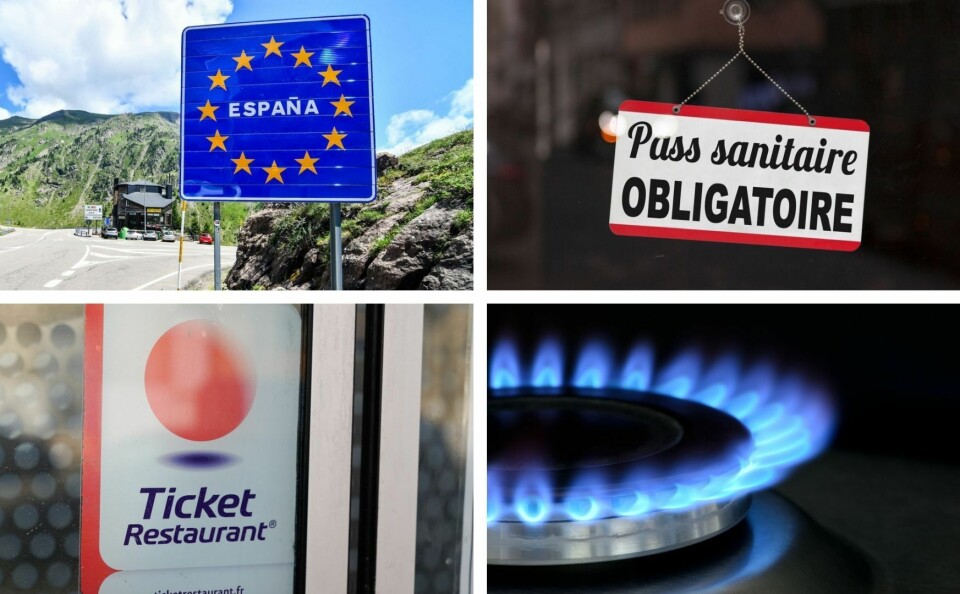-
France braces for a chilly end to 2025
French weekly weather forecast December 29 - January 2 sees temperatures drop to below freezing in many areas
-
'Remove traffic lights and road signs to encourage safer driving', says Louis Sarkozy
Son of former president says it would encourage 'more responsible' driving
-
Culture, sport and events: What's new in France in 2026
Including the Bayeux Tapestry, Six Nations and new museums
11 changes for residents in France from September 2021
The end of péage fees on a motorway between France and Spain, health passes for certain workers and rises to Netflix and gas tariffs are among new rules and other updates

A new month brings a host of new changes in France. Here is what is happening in September, as summer ends and la rentrée begins. These are the main 11 need-to-know changes.
Motorway between France and Spain is to be free
The AP-7, which connects Le Boulou, Pyrénées-Orientales and Barcelona, will become free to use. The Spanish government is still debating how to finance the road after previous concessions came to an end.
In the meantime, the road will be free to users. It is one of the most popular in Europe, with millions of annual users.
Read more: Motorway linking France and Spain to go toll-free
Paris speed limit set at 30kph
Most main roads within central Paris will be limited to 30kph, with the exception of the Bois de Boulogne and Vincennes roads, the Champs-Elysées, Avenue Foch, Avenue de la Grande-Armée, and rue Royale, which are staying at 50kph. The périphérique is also staying at 70kph.
There are concerns that the new limit will push up the price of taxis.
Tickets restaurant from 2020 no longer accepted
These will no longer be valid from September 1. Use of these vouchers to pay restaurant bills is still capped at €38 instead of €19, in a bid to help restaurants due to the health crisis. This is set to last until February 2022.
Read more: Daily lunch voucher limit to stay at €38
Netflix France subscription price rises
The monthly subscription price to the streaming giant will rise in France from €7.99 to €8.99, for new sign-ups and existing customers.
The packages will rise as follows:
- Formule Essentiel, one screen: €7.99 to €8.99
- Formule Standard, two screens: €11.99 to €13.49
- Formule Premium, up to four screens: €15.99 to €17.99.
Health pass needed for minors aged 12-17
This will come into force from September 30. Children and teenagers aged 12-17 will be required to show a health pass in the same way as adults to be able to access relevant spaces (restaurants, long-distance trains and coaches etc), with proof of vaccination, of a negative PCR test from within the past 72 hours, or proof of recent recovery from Covid. A health pass will not be needed for school.
Checklist: Where and when should I use the health pass?
Health pass needed for workers who have contact with public
People working in places that welcome the public and where the public is required to show a valid health pass to enter will need to have their own health pass to come to work. This entered into force on August 30 and applies to 1.8 million people.
The list includes people who work in bars and restaurants, cinemas and museums, nightclubs, festivals, zoos, libraries, entertainment venues, public transport over long-distance (such as TGVs or coaches), and shopping centres larger than 20,000m2 in areas where cases are higher than 200 per 100,000 inhabitants.
Other workers, such as those under 18, those who work in non-public areas or outside of normal hours, will only have to show a pass from September 30.
If the worker refuses, they may be offered work away from the public; or be given time off or paid leave until a solution is found. If no agreement is reached, they can be suspended.
If an employer is found to not be enforcing the health pass, they will be asked to close for seven days. In case of a repeat offence, they can be fined €9,000.
Read more: Health pass mandatory for 1.8 million workers
Mandatory vaccination for healthcare workers
Healthcare workers who have not yet been vaccinated will risk sanctions from September 15. Those who refuse risk suspension, loss of salary, and even losing their job.
Read more: Mandatory vaccine plan covers 1.5 million workers
Rising gas prices
Regulated gas prices will rise by 8.7% compared to the level of August 1, energy commission la Commission de régulation de l'énergie (CRE) has announced.
This rise will be 2.7% for households that use gas for cooking, 5.5% for those who use for it for cooking and hot water, and 9% for households that use gas for heating, the CRE said.
Drop in temporary lay-off benefits
The amount of state compensation for many companies in sectors badly affected by the health crisis and who have had to make use of temporary lay-offs is set to drop to just 36% of the person’s previous gross salary.
For employees of these companies, the rate of the partial activity allowance (indemnité d'activité partielle) that should be paid to them will drop to 60% of previous gross pay (72% net pay).
Changes to ‘solidarity funds’ for businesses
Economy Minister Bruno Le Maire confirmed the end of the “whatever it costs” approach which he said the government had taken so far to support businesses through the pandemic. However he promised that the government will continue to “support those who need it” from September 30.
Mr Le Maire is set to meet with leaders from the world of business and tourism to discuss the plans, along with Work Minister Elisabeth Borne, SME Minister Alain Griset, and Tourism Minister Jean-Baptiste Lemoyne.
The aim will be to “move from a general, flat-rate system, to a means-tested, tailored system, to really help each company in difficulty”, Mr Le Maire said.
Companies will be entitled to compensation of up to 20% of their losses, but must have made at least 15% of their usual amount compared to September 2019 to qualify. They will also be entitled to compensation of 90% of fixed costs not covered by revenue for businesses with fewer than 50 employees; and 70% for businesses with more than 50.
The new system had already come into force from March 31 this year, for businesses with a usual annual turnover of more than €1million.
The ‘solidarity funds’ first announced in March 2020 have so far cost €35billion.
Extra allowance for young apprentices
Young people working on a ‘professionalisation contract’ (work-based training towards a professional qualification) will now benefit from an extra allowance against their revenue, equivalent to the amount of the monthly minimum wage, when their rights to APL housing benefit are worked out by the Caf.
This means their total means-tested income will drop, so their APL benefit will rise.
This is to counteract a previous change in the working out of the benefit from the start of this year which meant the benefit had stopped or been lowered for many of those concerned by these work-based training contracts.
Related articles
Seven changes in France for residents from August 2021
Eating out, shops: What changes for Covid rules in France from June 30
























